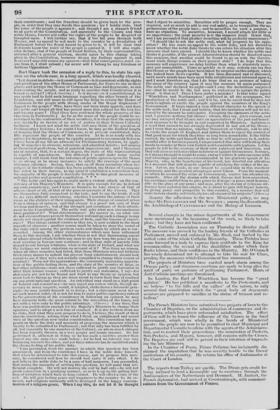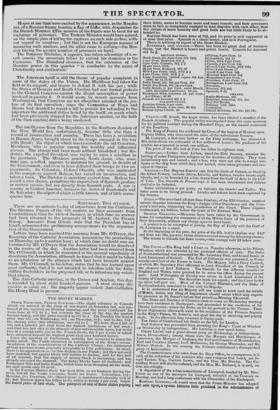The French Ministers have submitted two projects of laws to
the Chamber of Deputies, on the administration of communes and de- partments, which have given unbounded satisfaction. The effect of these will be to lessen the influence of the Crown in the local government, which was wholly in the hands of Ministerial agents : the people are now to he permitted to elect Municipal and Departmental Councils to advise with the agents of the Administra- tion, and to control their proceedings : the nomination of Prefects, Sub-Prefects, and Mayors, however, still remains with the Crown. The Deputies are said still to persist in their intention of impeach- ing the late Ministers.
In the Chamber of Peers, Prince Polignac has indignantly dis - claimed the imputation that he was secretly hostile to the liberal instiiuiions of his country. He retains his office of Ambassador at the Court of London.
The reports from Turkey are pacific. The Divan gets credit for being inclined to lend a favourable ear to overtures through the Ambassadors of the Netherlands and Denmark. M. Jaubert, the French diplomatist, had arrived at Constantinople, with communi- cations from the Government of France. Hopes at one time'were excited by the appearance, in the Bospho- rus, of a Russian frigate bearing a flag of true, with despatches for the Danish Minister. The mission of the frigate was to treat for an exchange of prisoners. The Turkish Minister would have agreed, on the simple plan of letting the captives on each side go free, with- out regard to numbers ; but this is not the European manner of managing such matters, and the affair came to nothing—the Rus- sian having the greater number of prisoners on hand. The Emperor Nicholas, it appears, has taken advantage of a re- volt among the mountain tribes to extend his dominion in the Caucasus. The Standard observes, that the extension of the Russian power in this quarter " is conducive to the cause of Christianity and civilization."



















 Previous page
Previous page